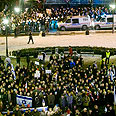
Anti-Israel protests in Oslo (Archive)
Photo: AP
Earlier this month, a survey by the Oslo Municipality found that 33% of Jewish students in the town are physically threatened or abused by other high school teens at least two to three times a month. The group thta suffered the next highest amount of bullying was Buddhists at 10%. “Others” were at 7% and Muslims at 5.3%. Furthermore, the survey found that 51% of high school students consider “Jew” a negative expression and 60% had heard other students use the term.
Mistake
Associated Press
State television apologizes for broadcasting 1930s 'Three Little Pigs' that critics say reinforces anti-Semitic stereotypes of era
The publication of these very negative findings came at an inconvenient time for Norwegian authorities. A few days later, an American Jewish group consisting of delegates from the Anti-Defamation League, B’nai Brith International and the Simon Wiesenthal Center, as well as Professor Marshall Breger, a former adviser on Jewish Affairs to President Ronald Reagan, arrived in Oslo.
The group had been invited by the DMT - the Oslo Jewish Community - for a two-day seminar on anti-Semitism. The Norwegian government helped finance the trip. The delegates were also to meet Foreign Minister Jonas Gahr Stoere and Minister of Education, Kristin Halvorsen. Critics who claim that anti-Semitism in Norway is disproportionate were not invited. However, some of the Americans met several of them elsewhere.
The seminar’s aim was to improve the global image of Norway’s attitude toward Israel and the Jews. Recent articles in the foreign media had detailed a variety of negative aspects. Shortly before the visit, an item by community member Martin Bodd in the Aftenposten daily became a further spoiler. His article illustrated that the DMT’s promotion of Norway as a “good place for Jews" was far too optimistic and that anti-Israelism and anti-Semitism in Norway tend to merge into one issue. Bodd had already spoken at an international gathering of the Anti-Defamation League in 2002 about Norwegian anti-Semitism and in particular the harassment of Jewish students in schools.
This seminar with the American invitees was a radical departure from previous Norwegian policies. The usual defense against the rare foreign critics consists of five elements. First of all, the fact that very little information was available until two years ago in a language other than Norwegian was a formidable barrier.
Secondly, the Norwegian media hardly report about foreign criticism of their country. One infamous case of silence was a letter written by then-US Senator Sam Brownback in August 2010 to Wegger Strommen, the Norwegian ambassador in Washington. In it, the senator complained about anti-Semitism and anti-Israelism in the country.
A letter from the Simon Wiesenthal Center was appended and mentioned extreme negative actions of inter alia Prime Minister Jens Stoltenberg, as well as Ministers Stoere and Halvorsen. Also mentioned was Deputy Environment Minister Fiskaa, who had stated that before she entered the government, she dreamt about the UN launching rockets against Israel.
However, only two small papers in Norway gave the letter any attention. When Stoere was asked about it, he brushed it off as if a senator is some kind of irrelevant anonymous American.
A third defensive method involves frequent lying about inconvenient facts. One example: In January 2009 Trine Lilleng a junior diplomat in the Norwegian embassy in Saudi Arabia sent - via her ministry - email pictures of the Cast Lead Operation in Gaza juxtaposed with those of the Holocaust. The next month, Stoere told Israeli daily Maariv that she had been recalled home. A few months after that, a Haaretz reporter phoned the Norwegian embassy in Riyadh and asked to speak with her. The operator said that Consul Lilleng was out, but that he should try again a half hour later. Apparently, this diplomat had been promoted.
Haaretz then challenged the Norwegian foreign office. It answered that indeed, Stoere had told Maariv that Lilleng was no longer there, but that the press attaché who accompanied the minister had corrected him on the spot. When the Haaretz reporter asked his colleague at Maariv to check the tape, no such correction was there.
The fourth element of defense consists of demonizing foreign critics. From my own personal experience, I could easily fill an op-ed with examples, without even quoting from my collection of Norwegian hate mail. If none of these defense elements help, the fifth and last weapon is brought into action. Leading members of the Norwegian Jewish community come out publicly against the critics, minimizing part of the anti-Semitic events.
In retrospect, it seems that the tipping point in exposing Norway abroad was Professor Alan Dershowitz’ visit in March of this year. Three Norwegian universities refused his offer of a free lecture on Israel and international law. Dershowitz thereupon compared his Norwegian experience with a visit to South Africa under apartheid in a Wall Street Journal op-ed. Demonizing Dershowitz, who is probably better known than Norway in the US, could be of no help. A reply defending Norway by its former Chief Rabbi, Israeli ex-minister Michael Melchior, had little impact.
The findings culled from the recent study on anti-Semitism in the Oslo schools are embarrassing for Norway because they come from an official source. Stoere told the American delegates that anti-Semitism is everywhere, and it is a cancer that should be fought. He added that Norway is not special in this matter. The survey by the Oslo Municipality shows quite the opposite. Stoere and Halvorsen also often apply the same discriminatory methods to Israel as regular anti-Semites do to Jews.
As Norway is closing down now for the summer holidays, its leaders hope in vain that in the meantime all will be forgotten abroad.
Manfred Gerstenfeld has published 20 books. In two of them he addresses anti-Semitism and anti-Israelism in Norway
- Follow Ynetnews on Facebook















